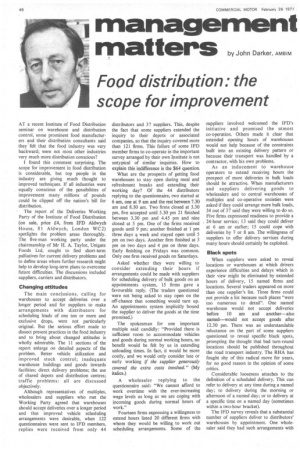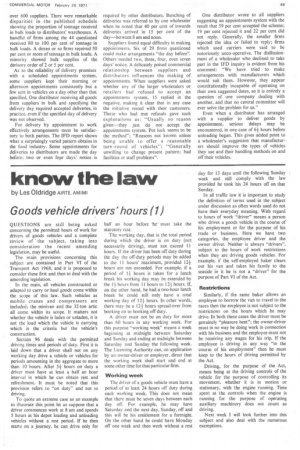management
Page 50

Page 51

If you've noticed an error in this article please click here to report it so we can fix it.
matters by John Darker AMBIM
Food distribution: the scope for improvement
AT a recent Institute of Food Distribution seminar on warehouse and distribution control, some prominent food manufacturers and their distribution consultants said they 'felt that the food industry was very backward; were not most other industries very much more distribution conscious?
I found this comment surprising. The scope for improvement in food distribution is considerable, but top people in the industry are giving much thought to improved techniques. If all industries were equally conscious of the possibilities of improvement many millions of pounds could be clipped off the nation's bill for distribution.
The report of the Deliveries Working Party of the Institute of Food Distribution (on sale, price £4, from IFD Aldwych House, 81 Aldwych, London WC2) spotlights the problem areas thoroughly. The five-man working party under the chairmanship of Mr H. A. Taylor, Unigate Foods Ltd, sought to find short-term palliatives for current delivery problems and to define areas where further research might help to develop long-term plans to overcome future difficulties. The discussions included suppliers, carriers and distributors.
Changing attitudes The main conclusions, calling for warehouses to accept deliveries over a longer period and for suppliers to make arrangements with distributors for scheduling lbads of one ton or more and exclusive drops, were not particularly original. But the serious effort made to dissect present practices in the food industry and to bring about changed attitudes is wholly admirable. The 11 sections of the report enlarge on detailed pspects of the problem. Better vehicle utilization and improved stock control; inadequate warehouse buildings and goods inwards facilities; direct delivery problems; the use of shared depots and distribution centres; traffic problems: all are discussed objectively.
Although representatives of multiples, wholesalers and suppliers who met the Working Party agreed that warehouses should accept deliveries over a longer period and that improved vehicle scheduling arrangements were desirable, when 122 questionnaires were sent to IFD members, replies were received from only 44 distributors and 37 suppliers. This, despite the fact that some suppliers extended the inquiry to their depots or associated companies, so that the inquiry covered more than 121 firms. This failure of some IFD member firms to co-operate in the important survey arranged by their own Institute is not untypical of similar inquiries. How to explain this indifference is the $64 question.
What are the prospects of getting food warehouses to stay open during meal and refreshment breaks and extending their working day? Of the 44 distributors replying to the questionnaire, two started at 6 am, one at 9 am and the rest between 7.30 am and 8.30 am. Two firms closed at 3.30 pm, five accepted until 5.30 pm 21 finished between 3.30 pm and 4.45 pm and nine closed at 5 pm. One of the firms received goods until 9 pm; another finished at 1 pm three days week and stayed open until 5 pm on two days. Another firm finished at 3 pm on two days and 4 pm on three days. Early finishing on Fridays was common. Only one firm received goods on Saturdays.
Asked whether they were willing to consider extending their hours if arrangements could be made with suppliers for scheduling delivery of bulk goods on an appointments system, 15 firms gave a favourable reply. (The •traders questioned were not being asked to stay open on the off-chance that something would turn up. An appointments system implicitly bound the supplier to deliver the goods at the time promised.)
The spokesman for one important multiple said candidly: "Provided there is sufficient room to accommodate vehicles and goods during normal working hours, no benefit would be felt by us in extending unloading times. In fact, it would be more costly, and we would only consider late or early working if the supplier generously covered the extra costs involved." (My italics.)
A wholesaler replying to the questionnaire said: "We cannot afford to work overtime with the ever-increasing wage levels as long as we are coping with incoming goods during normal hours of work."
Fourteen firms expressing a willingness to extend hours listed 20 different firms with whom they would be willing to work out scheduling arrangements. Some of the suppliers involved welcomed the IFD's initiative and promised the utmost co-operation. Others made it clear that extended opening hours of warehouses would not help because of the constraints built into an existing delivery pattern or because their transport was handled by a contractor, With his own problems.
As an inducement to warehouse operators to extend receiving hours the prospect of more deliveries in bulk loads should be attractive. When manufacturers and suppliers delivering goods to wholesalers and to central warehouses of multiples and co-operative societies were asked if they could arrange more bulk loads, 34 out of 37 said they were willing to do so. Five firms expresseed readiness to provide a 24-hour service; 13 said they could deliver at 6 am or earlier; 15 could cope with deliveries by 7 or 8 am. The willingness of suppliers to offer delivery. services during many hours should certainly be exploited.
Black spots When suppliers were asked to reveal locations or warehouses at which drivers experience difficulties and delays which in their view might be eliminated by extended hours of delivery, 15 named firms and locations. Several traders appeared on more than one supplier's list. Three firms could not provide a list because such places "were too numerous to detail". One named warehouse would not accept deliveries before 10 am and another—also named—would not accept goods after 12.30 pm. There was an understandable reluctance on the part of some suppliers questioned to reveal specific black spots, prompting the thought that bad turn-round locations should be published throughout the road transport industry. The RHA has fought shy of this radical move for years, for no good reason in the opinion of some critics.
Considerable looseness attaches to the definition of a scheduled delivery. This can refer to delivery at any time during a named day; to delivery during the morning or afternoon of a named day; or to delivery at a specific time on a named day (sometimes within a two-hour bracket).
The IFD survey reveals that a substantial number of suppliers deliver to distributors' warehouses by appointment. One wholesaler said they had such arrangements with over 600 suppliers. There were remarkable disparities in the published schedule showing the proportion of tonnage received in bulk loads to distributors' warehouses. A handful of firms among the 44 questioned received 80 to 100 per cent of tonnage in bulk loads. A dozen or so firms received 50 per cent or more of tonnage in bulk loads. A minority showed bulk supplies of the derisory order of 2 or 5 per cent.
As to the reliability of delivery promises with a scheduled appointments system, some suppliers kept their morning or afternoon appointments consistently but a few sent in vehicles on a day other than that specified. One distributor receiving all goods from suppliers in bulk and specifying the delivery day required accepted deliveries, in practice, even if the specified day of delivery was not observed.
For delivery by appointment to work effectively arrangements must be satisfactory to both parties. The 1FD report shows what a surprisingly varied pattern obtains in the food industry. Some appointments for deliveries to distributors are made the day before; two or even four days' notice is required by other distributors. Bunching of deliveries was referred to by one wholesaler when he noted that 40 per cent of inwards deliveries arrived in 15 per cent of the day—between 8 am and noon.
Suppliers found equal difficulty in making appointments. Six of 29 firms questioned could make arrangements "the day before". Others needed two, three, four, even seven days' notice. A delicately poised commercial relationship between suppliers and distributors influences the making of appointments. When suppliers were asked whether any of the larger wholesalers or retailers had refused to accept an appointments system, 15 replied in the negative, making it clear that in any case the initiative rested with their customers. Those who had met refusals gave such explanations as: "Usually no reason given—they just do not accept the appointments system. Pot luck seems to be the method"; "Reasons not known unless being unable to offer a reasonable turn-round of vehicles"; "Generally unwilling to change present pattern; bad facilities or staff problems". One distributor wrote to all suppliers suggesting an appointments system with the result that 59 per cent accepted the scheme; 19 per cent rejected it and 22 per cent did not reply. Generally, the smaller firms rejected the idea or failed to reply; firms which used carriers were said to be notoriously unco-operative. The disillusionment of a wholesaler who declined to take part in the IFD inquiry is evident from his comment: "We have tried to make ariangements with manufacturers which would suit them. However, they appear constitutionally incapable of operating on their own suggested dates, so it is entirely a question of one company dealing with another, and that no central committee will ever solve the problem for us."
Even when a distributor has arranged with a supplier to deliver goods by appointment, serious delays may be encountered, in one case of 61 hours before unloading began. This gives added point to a wholesaler's suggestion that manufacturers should improve the types of vehicles• they use and their handling methods on and off their vehicles.




























































































